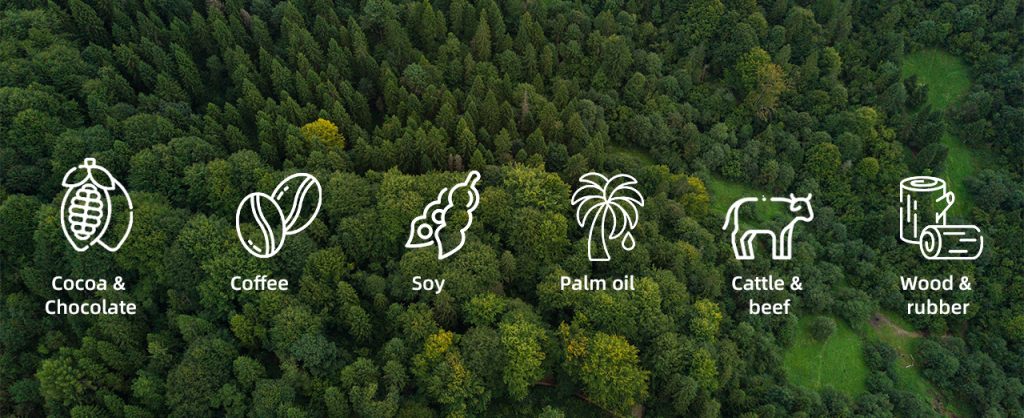
The global crisis of deforestation is becoming increasingly severe, with approximately 13 million hectares of forest disappearing each year due to agricultural expansion, logging, and urbanization, posing a serious threat to biodiversity and climate stability. To address this challenge, the European Union introduced the EU Deforestation Regulation (EUDR) in 2022, aiming to curb the import of products linked to deforestation and promote sustainable land use. As businesses prepare to comply with this regulation, understanding its background, key provisions, and potential impacts is crucial. This article explores how companies can effectively respond to the new compliance requirements while contributing to global sustainable development.
- Background and Legislative Reasons
The rate of global deforestation is alarming. According to the Food and Agriculture Organization (FAO), around 13 million hectares of forest are lost annually, mainly due to agricultural expansion, logging, and urbanization. This phenomenon severely impacts ecosystems, exacerbates climate change, and reduces biodiversity. Therefore, the EU proposed the EUDR in 2022 to reduce its market dependency on products that contribute to deforestation and to promote sustainable development worldwide.
The legislative purpose of the EUDR is to establish strict import standards for products at risk of causing deforestation, thereby promoting sustainable land use. This regulation aligns with the EU’s European Green Deal, aiming to achieve carbon reduction targets by 2030 and climate neutrality by 2050.
- Key Provisions of the Regulation
The EUDR covers several categories of products, including timber, paper products, soy, palm oil, coffee, and cocoa. The production of these goods is closely related to deforestation, and the regulation aims to limit their import to reduce forest destruction.
Under the regulation, EU importers and suppliers must conduct due diligence to ensure their products do not originate from illegally deforested areas and must provide detailed traceability information. Specifically, businesses must supply proof of “no deforestation” and ensure supply chain transparency to comply with EUDR requirements.
The regulation is set to officially take effect in 2024, allowing businesses to make necessary compliance adjustments beforehand. The EU will establish a dedicated regulatory authority to oversee and enforce the EUDR provisions.


- Impact Analysis
The implementation of the EUDR will have profound effects on businesses, consumers, and the environment. For companies, compliance requirements will drive transparency in global supply chains, prompting businesses to strengthen supplier audits and management. At the same time, companies will need to invest more resources into compliance, potentially leading to increased operational costs. Non-compliant businesses may face risks regarding market access.
For consumers, the implementation of the EUDR may affect product prices and choices. To meet the regulation’s requirements, some companies may raise their product prices, directly influencing consumers’ purchasing decisions. However, in the long run, the EUDR may also promote the consumption of sustainable products and enhance consumer awareness of environmental protection.
From an environmental and social perspective, the EUDR’s implementation helps reduce the rate of deforestation, protect biodiversity, and improve the health of ecosystems. This holds positive significance for the global response to climate change and achieving sustainable development goals.


- Impact on Products and Countries
The EUDR significantly impacts specific products and countries.
Impact on Specific Products:
Timber and Paper Products: Due to high demand and resource scarcity, producers will need to raise sustainable forest management standards, potentially increasing production costs.
Soy and Palm Oil: Major producing countries may need to adopt stricter agricultural practices to meet EUDR requirements, directly affecting their export markets and revenues.
Cocoa and Coffee: With increasing demand for sustainable certification, smallholder farmers may need to adjust their production methods or risk losing market access.
Impact on Different Countries:
Major Producing Countries: Countries like Brazil and Indonesia may face stricter export standards, prompting them to enhance environmental protection measures, though this could create short-term economic pressure.
Developing Countries: Small and medium-sized producers may lose market access due to compliance costs and may need international aid and technical support to adapt to new requirements.
Developed Countries: Businesses will need to enhance compliance capabilities and promote sustainable sourcing, potentially raising product costs and affecting market competitiveness.
- Challenges and Controversies
Despite the clear goals of the EUDR, its implementation faces numerous challenges. First, the complexity of supply chains makes enforcement difficult. Many products have supply chains that span multiple countries, making it challenging to ensure compliance at every stage.
Additionally, stakeholders have varied perspectives on the EUDR. Businesses are concerned about rising compliance costs, producing countries may perceive the regulation as a form of trade protectionism, while environmental organizations hope for stricter measures to achieve greater environmental protection outcomes.
- The Double-Edged Sword Effect
The implementation of the EUDR can be viewed as a double-edged sword. On the one hand, in terms of environmental protection, the EUDR aims to reduce global deforestation and promote awareness of sustainable production. In the long term, this will help mitigate climate change and protect biodiversity.
However, the EUDR may lead to “carbon leakage,” where some countries or businesses might shift to other markets without EU requirements, particularly in regions with lower environmental standards, exacerbating deforestation there.
In terms of transparency and complexity in global supply chains, the EUDR will promote transparency and traceability, enhancing consumer trust in products. However, for small and medium-sized enterprises in some developing countries, compliance requirements could impose significant cost burdens, potentially diminishing their market competitiveness and increasing poverty.
Economically, the EUDR may drive the green economy and sustainable development but could also stifle development in certain regions due to high costs, exacerbating economic inequality.
- Future Outlook
The implementation of the EUDR will have far-reaching global impacts, potentially encouraging other countries to introduce similar regulations and creating global green trade standards. Businesses responding to this new regulation will need to proactively take measures, such as enhancing supply chain management, applying technological tools (like blockchain for traceability), or collaborating with certification organizations to ensure compliance.
- Conclusion
Overall, the EUDR represents a significant step in the global response to deforestation and climate change. Despite facing numerous challenges, its potential benefits for environmental protection and sustainable development should not be overlooked. As the regulation is implemented, countries, businesses, and consumers worldwide will collectively engage in this transformation, driving towards a more sustainable future.

